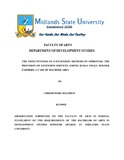Please use this identifier to cite or link to this item:
https://cris.library.msu.ac.zw//handle/11408/3517| Title: | The effectiveness of e-extension methods in improving the provision of extension services among rural small holder farmers: a case of Macheke area | Authors: | Chikohwero, Solomon | Keywords: | Community participation Development needs |
Issue Date: | 2018 | Publisher: | Midlands State University | Abstract: | Community participation is a concept meant to ensure that community members are an integral part of processes that determine their destination in relation to their development needs. It is a means of empowering people by developing their skills and abilities to enable them to negotiate and make appropriate decisions for their development. Community participation, however, is not without its challenges. Most often, community members are consulted after decisions are made by government agencies with regards to the kind of development projects that need to be implemented. As a consequence, community development projects which are intended to improve the quality of life of the majority of communities in South Africa, do not meet this objective. The aim of this study was to evaluate community participation in rural development projects and focuses on the Chimanimani Rural District specifically Shinja community (ward 9) in the Manicaland province of Zimbabwe as a case study. The research asks the following questions: What is the nature of and extent to which community members participate in rural development projects? What are the challenges to community participation in rural development projects and how can these challenges be addressed? An evaluative research design and qualitative and quantitative methodologies were used. The sample groups were the community members and the WVZ officials and semi-structured questionnaires as interview guides for data collection were used. The study revealed that the majority of the respondents did not participate in the initiation and planning stages of the projects. And the study further revealed that no income and low-income, politics, favoritism, long working hours, illiteracy, low self-esteem, lack of training, lack of resources, lack of communication, lack of information and transparency about the projects are the challenges of participation. It is therefore recommended that, the government should support the community in all levels to ensure a strong commitment to participation in their development projects. It is anticipated that this study will enable the community members and all role players involved in the Chimanimani Rural District development projects to realize the importance and advantages of community participation and that they will work through the challenges in order to increase community participation in development projects. | URI: | http://hdl.handle.net/11408/3517 |
| Appears in Collections: | Bachelor Of Arts In Development Studies Honours Degree |
Files in This Item:
| File | Description | Size | Format | |
|---|---|---|---|---|
| R133992F.pdf | Full Text | 1.54 MB | Adobe PDF |  View/Open |
Page view(s)
116
checked on Apr 27, 2025
Download(s)
176
checked on Apr 27, 2025
Google ScholarTM
Check
Items in MSUIR are protected by copyright, with all rights reserved, unless otherwise indicated.



